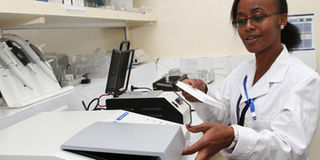New cervical cancer testing device out

Head of Molecular Applications lab at the KAVI Institute of Clinical Research (KAVI -ICR) at the Kenyatta National Hospital, Lucy Macharia explaining how a hybrid capture system machine for early detection of cervical cancer is used on March 17, 2015. PHOTO | JENNIFER MUIRURI | NATION MEDIA GROUP
What you need to know:
- In Kenya, cancer is the third leading cause of death after infectious and cardiovascular diseases. Breast and cervical cancers are the biggest killers of women.
- Head of Molecular Applications Lab at the institute Lucy Macharia Tuesday said the test, called careHPV, would be cost-effective and efficient.
- Six in 10 cervical cancer cases in the country end in death because they are not detected early.
It will now take just three hours to detect cervical cancer.
University of Nairobi’s Kavi Institute of Clinical Research has acquired testing equipment called Hybrid Capture System from the Netherlands. The kit can detect chronic human papilloma virus early and more accurately than the pap-smear test.
The test can notify doctors about early infections caused by the virus that have a high likelihood of triggering abnormal cell growth.
In Kenya, cancer is the third leading cause of death after infectious and cardiovascular diseases. Breast and cervical cancers are the biggest killers of women.
Breast cancer accounts for 34 per 100,000 cases while cervical cancer is 25 per 100,000.
Head of Molecular Applications Lab at the institute Lucy Macharia Tuesday said the test, called careHPV, would be cost-effective and efficient.
“The test can detect 14 types of the virus from a sample that can either be taken through a smear by a health worker or the patient. It is accurate by about 80 per cent compared to pap smear whose accuracy is 50 per cent. The cost will also be subsidised but the exact figures are yet to be agreed on,” she said.
There are more than 100 different variants of HPV. However, types 16 and 18 are known to cause cervical cancer in about 70 to 75 per cent of the cases.
As of 2012, Kenya Cancer Registry estimated the annual number of cervical cancer cases at 2,454, with 1,676 fatalities.
Nairobi registers 10 to 15 new cervical cancer cases every week.
NOT DETECTED EARLY
Six in 10 cervical cancer cases in the country end in death because they are not detected early.
Delay in detection has been attributed to myths and misconceptions about the disease.
Ms Macharia spoke on the sidelines of the first HPV Conference at the institute that brought together global experts and researchers.
The conference was opened by Dr Jack Kioko from the Ministry of Health.
“Cervical cancer screening coverage in Kenya among women of 18-69 years is only 3.2 per cent. Some cases are diagnosed late and may be fatal. Early detection is important for treatment, otherwise, it is projected that by 2025, we will be recording over 4,000 cases every year,” said Dr Kioko.
The virus can live in a woman’s body for more than 10 years without being detected.
It leads to uncontrolled growth of cells in the cervix which can develop into tumours. Over time, one develops cancer characterised by severe bleeding, backaches, among other symptoms.





